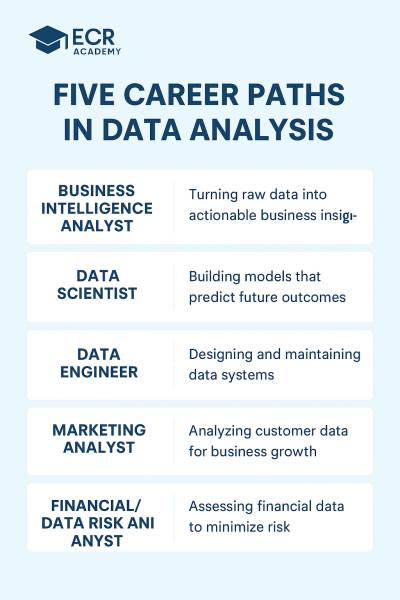
SOPHIA OLISE
 Data Analysis
Data Analysis
 0 comment
0 comment
 10 Sep, 2025
10 Sep, 2025

The world of business is transforming, and data analysis is at the heart of this change. With organizations across Nigeria and globally seeking to make smarter, data-driven decisions, the demand for skilled analysts is at an all-time high. But the field of data analysis is not a single career; it's a gateway to diverse, high-growth professional paths.
After mastering the foundational skills, you can specialize in a role that best suits your interests and strengths. Here are five exciting career paths you can pursue once you've learned data analysis at ECR Academy.
The BI Analyst is a professional data storyteller. Their primary job is to take raw, complex data and transform it into clear, easy-to-understand reports and visualizations. They build interactive dashboards for managers and executives, helping them monitor key performance indicators (KPIs) and make better business decisions. If you enjoy data visualization and are a good communicator, this is an excellent path.
Often called the "next-level" analyst, a Data Scientist goes beyond just reporting on what happened. They use advanced statistical analysis and machine learning to build predictive models and uncover hidden patterns. They might predict customer churn, recommend products to users, or detect fraud. This role requires a strong background in mathematics and programming.
Think of a Data Engineer as the architect of a company's data infrastructure. Before any analysis can happen, the data must be collected, stored, and made ready for use. Data Engineers design and maintain these systems, ensuring the data is clean, reliable, and accessible for both analysts and data scientists. They are the backbone of any data-driven organization.
In a world driven by social media and online advertising, Marketing Analysts are invaluable. They specialize in understanding customer behavior and the effectiveness of marketing campaigns. By analyzing website traffic, social media engagement, and ad performance data, they help businesses optimize their spending and grow their customer base.
In the finance and insurance sectors, every decision carries a risk. Financial and Data Risk Analysts use data to identify, measure, and mitigate potential risks. They work on projects like fraud detection, credit risk assessment, and market trend analysis. This role is crucial for ensuring the stability and security of financial systems.
The data analysis field is full of opportunities for growth and specialization. The path you choose depends entirely on your interests and what you find most exciting. The good news is that no matter which direction you take, they all begin with the same core skills: data cleaning, SQL, and data visualization.
Whether you're starting or upgrading your tech skills, you can begin your learning journey with us today.
Review Affordable Tech Course with us at ECR Academy We provide the hands-on, project-focused training you need to master tech skills like Digital Marketing, Web development, Data Analysis, Cybersecurity.
Build Comprehensive Digital Solutions with ECR Technology Services Limited Let us help you bring your brand, business, or idea online with professional digital solutions such as secure, responsive websites, robust mobile applications, high-impact digital marketing templates, and specialized Learning Management Systems (LMS).
Contact Us Today:
Not always. Tools like Excel and Power BI don’t require coding, but learning SQL or Python is a big plus.
Data Science and Data Engineering roles typically have higher salaries due to their technical demands.
Yes! Many Nigerian graduates from non-technical fields successfully transition into data roles after short courses or bootcamps.
Banking, fintech, telecoms, healthcare, and e-commerce are top recruiters.
Start with Excel and Power BI for foundational analysis, then grow into SQL or Python.
SOPHIA OLISE
Data Analyst
Olise Sophia Amarachi is a passionate and purpose-driven data analyst and digital skills advocate based in Nigeria. With a strong foundation in Excel, Power BI, and SQL, she empowers others—especially young people and corps members—through practical training, tech mentorship, and values-based leadership. Sophia’s journey into data analysis began during her NYSC year in Abia State, where she committed herself to learning and growing from scratch. Today, she shares her knowledge through online classes, challenges, and hands-on projects, including dashboards and reports that translate complex data into clear insights.
0 comment